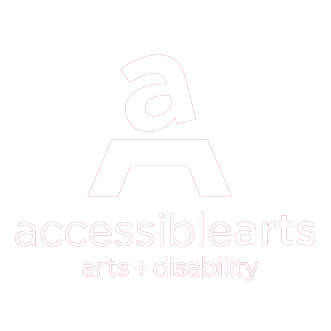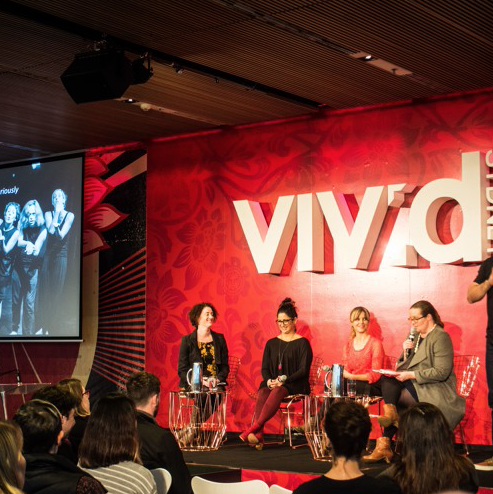We’re Very Serious – taking artists with disability seriously
How do theatre makers, visual artists and dancers with disability get taken seriously as artists?
Three Winston Churchill Fellows joined forces recently to discuss this question and their research, at a Vivid Ideas Exchange event at the Museum of Contemporary Arts. Here’s a summary of each of their key findings and a snippet from the Q and A that followed the talk, facilitated by Morwenna Collett, CEO at Accessible Arts. You can listen to the entire talk on Soundcloud.
Sarah-Vyne Vassallo is founder and artistic director of Murmuration, an integrated dance company based in Sydney.
Her research explored choreographic processes for creating and presenting contemporary dance theatre within an integrated environment for dancers with and without disability. This took her from the USA to the UK and Spain where she focused on creation, education and curation.
Key findings:
- There is a major need in Australia for higher-level artistic opportunities for people with disability.
- There is also a major need for higher education pathways for dancers with disability across the board.
- There can’t be a once size fits all model when it comes to accessibility. Allow time in project planning to implement personalised approached for the support systems needed. Read Sarah-Vyne’s full Churchill report.
Gabrielle Mordy is Artistic Director at Studio A, a supported studio that tackles the barriers that artists living with intellectual disability face.
For her Fellowship, she explored systems that support artists with intellectual disability to participate within mainstream art networks. This took her to supported studios in the UK and USA.
Key findings:
- Social, political and cultural trends significantly impact how artists with intellectual disability interact with the mainstream art world.
- Successful supported studios have good governance, clear strategic direction, staff trained in the arts and strong networks.
- They have also renovated their studios and and galleries inline with professional arts industry standards. Read Gabrielle’s full Churchill report.
Alison Richardson is Director, Founder and Co-collaborator with RUCKUS, a disability-led contemporary performance ensemble.
Alison’s research explored disability-led practices in theatre and inclusive training and mentoring models. She visited more than 15 organisations in Norway, Sweden and the UK.
Key findings:
- In Australia, we certainly don’t lack pioneers, visionaries or talent but what we do lack is funding and support for artists.
- There are many barriers to full inclusion in terms of training and formal education.
- Vision, persistence, dedication, resilience and sheer hard work are qualities that most people working in the arts and disability sector possess and are keys to success. Read Alison’s full Churchill report.
Q and A (You can listen to the whole Q and A session on Soundcloud.)
Q) What will it take in Australia for artists with disability and their work to be taken seriously?
Gabrielle: “I find mindsets are changed when I show actual work that an artist with disability has created. The work and the quality of work speaks for itself and is the most effective mindset changer.”
Alison: “It’s getting the work out there and for programmers, producers and curators to take the work seriously and coming along and watching stuff. Then they might program it into their venues and festivals.”
Q) What’s next in terms of pursuing your research further?
Sarah-Vyne: “I left my Fellowship on such a high that I started Mumuration as if it had been around for five years, and burnt myself out! Right now, it’s about focusing on directing work and getting the work out there.”
Gabrielle: “Seeing the decisions that some of the directors of supported studios internationally have made has really influenced me. I can see the importance of building networks where the market is. There’s a big market in the US for artwork from supported studios. I’m meeting with more galleries and building relationships.”
Alison: “I’m keen to develop the team so that they can become leaders in their own community and can run their own workshops and develop themselves as performers.”
The event was presented and was MC’d by RUCKUS ensemble member, and Tropfest Award winning actor and advocate for people with intellectual disability Gerard O’Dwyer.

